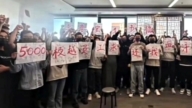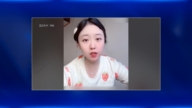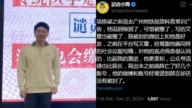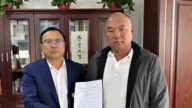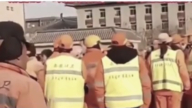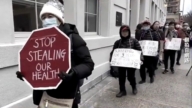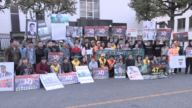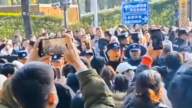【新唐人2013年07月02日讯】新疆局势进一步紧张,29号早上,中共中央政治局常委俞正声带领工作组抵达乌鲁木齐。新疆武警开始全天候巡逻,官方还加强了网络监控,查处19名在微博等网络平台发消息的网民。中国问题研究人士指出,事件的关键不在于维、汉冲突,而是少数民族和中共的冲突。
29号,俞正声带头和另3名官员抵达新疆,他们分别是中央政法委书记孟建柱、公安部部长郭声琨、和国家民委主任王正伟。随行工作组中,还有中共政法委的其他高层官员。
旅美中国问题研究人士张健表示,派出的官员级别越高,显示官方对目前的新疆局势越紧张。
旅美中国问题研究人士张健:“新疆出现这个事件,足以证明中共对少数政策的彻底失败。那中共的高层可能对这个事情震惊、害怕。所以以前,就是在江(江泽民)时代的那个维稳的意识形态又出现了。导致了这么多相关部门的一把手,全部到了新疆,去坐镇指挥。”
俞正声等人到达乌鲁木齐以后,乌鲁木齐当天就封锁市区主要道路,进行了大规模武警演习,至少有一万名军警参加,也是09年“7‧5事件”以来,规模最大的一次。当晚,孟建柱还要求新彊武警部队,“实行24小时全天候执勤巡逻”。
张健:“这次他们这些高层集体到了新疆之后,足以证明,第一、维稳还是他们首先要确保的一个任务;第二、为了维稳,他们不惜去给少数民族人民,增加更多的生活和其他领域的困扰;第三、这个事态过后,我们还会看到,中共对少数民族,或者对新疆的政策,还是原来那样。”
一名乌鲁木齐张姓市民形容,官方采取的“强势维稳”手段,造成乌鲁木齐的形势非常紧张。
乌鲁木齐市民张先生:“现在乌鲁木齐街道和市场上,人比平时少很多。就是感觉气氛和当年‘7‧5’一样。我现在最担心的就是它(中共)切断网络。”
新疆当局除了加强对市区的控制,还加强了网络监控,公安查处了19名所谓的“网上编造谣言者”。不仅是新疆网民,甚至连广东的网民,也因为引用《法新社》记者拍摄的,鄯善县冲突事件图片和部分文字,遭到东莞警方的恐吓。
张先生:“这些事情发生以后,每次都是官媒报导了以后,很快就删除了。并且官媒报导的也很简短。看到其他媒体采访被拦截、停相机、然后网民发布消息被抓,已经有19起了。对于官方消息,我是持慎重态度的。”
目前约有900万名维族人住在新疆。而新疆“7‧5事件”再过几天就到了4周年。乌鲁木齐市警方19号已宣布,将展开严打专案行动,为期三个月。
张健指出,事件的关键不在于维、汉冲突,或少数民族和中共的冲突,而是中共这个体制,确实对全人类犯下了大罪。
张健:“在中国来说,对少数民族它也是天怒人怨。那么在多数民族——汉族当中,中共就受到了欢迎吗?任何一个民族,都对中共深恶痛绝。它所犯下的罪行,已经是天怒人怨,它所推行的制度,是完全不符合当今这个民主潮流的。”
2009年的“7‧5事件”造成200多人丧生。当时西方媒体普遍认为,中共实行的少数民族政策一直存在问题,但官方并没有检讨少数民族政策,反而把矛头对着境外异议人士热比娅,想要把问题焦点从国内转向国外。
流亡海外的“世界维吾尔代表大会”主席热比娅,6月30号与其他30多名抗议者,在中共驻东京使馆前示威。在此前一天,热比娅在网站视频中表示:“新疆情况非常严峻,我们一直要求中国政府展开对话,但得不到任何回应,北京根本不想听我们的意见。”
采访/刘惠 编辑/尚燕 后制/肖颜
What Has Caused Recent Incidents in Xinjiang?
On June 29, the China Central Committee working group,
led by Yu Zhengsheng, arrived in Urumqi, Xinjiang.
Armed Police have started 24 hour patrols of the city,
and officials have also increased internet monitoring.
19 web users who released messages about the
recent incidents have already been investigated.
China experts says the key issue of
this incident is not a racial problem.
It is a conflict between oppressed ethnic
minorities and the Chinese Regime.
On June 29, Yu Zhengsheng and
three other officials arrived in Xinjiang.
The Working Group includes Meng Jianzhu,
Secretary of the Central Political and Law Committee.
It also includes Guo Shengkun, Minister of Public Security
and Wang Zhengwei, Chief of State Ethnic Affairs Committee.
Other senior officials of the CCP Politics and
Law Committee have also traveled to Xinjiang.
US-based China expert Zhang Jian says that in China,
if high level officials are sent, it indicates a critical situation.
Zhang Jian: “The Xinjiang incident proves the complete
failure of Communist policies toward Chinese minorities.
Top officials of the Chinese Communist Party
(CCP) are worried and shocked by this incident.
Thus, it is like the era of Jiang Zemin, to maintain stability.
They have sent so many high officials
to control the situation in Xinjiang.”
As Yu’s group arrived in Urumqi, all main
roads were blocked on the same day.
Armed police have carried out a large-scale
exercise, with at least ten thousand police.
This is the largest incident since the 2009 “7-5 Incident”.
That night, Meng Jianzhu also required “24-hour patrol duty.”
Zhang Jian: “This time, these high
level executives traveled to Xinjiang.
It proves, firstly, that their priority
is to ensure stability is maintained.
Secondly, in order to safeguard stability, they won’t
hesitate to destroy the lives of the ethnic minorities.
However, this will bring extra trouble.
Thirdly, we will see that when this is over, CCP policy
toward these minorities, and Xinjiang, will remain the same.”
‘Zhang’, an Urumqi citizen described that the official stance
of “maintaining stability" has resulted in a severe situation.
‘Zhang’, Urumqi citizen: “Now you can see far less
people than usual in the streets and markets in Urumqi.
It has the same feelings as the atmosphere of ‘7-5’.
I worry most that it (CCP) could cut off our internet.”
Xinjiang authorities are strengthening control of
urban areas, as well as monitoring on the internet.
It has investigated 19 so-called “fabricated internet rumors."
It is not only netizens in Xinjiang that have faced trouble.
Netizens in Guangdong have also come under threat,
after using images and text from “AFP" as references.
They received intimidation from Dongguan police.
‘Zhang’, Urumqi citzen: “Every time an incident occurs,
official media reported, and then they quickly deleted it.
Official media reports are very brief. For other medias,
interviews are intercepted or camera’s are confiscated.
If netizens publish messages online, they are intercepted.
So far, there have been 19 such cases already,
but for me, I don’t quite trust official sources.”
There are approximately 9 million
Uighurs living in Xinjiang Province.
The fourth anniversary of the Xinjiang
“7-5 Incident” is in a few days.
Urumqi police announced on June 19 that it will
expand it’s crackdown action for three months.
China export Zhang Jian says that the key
issue of this incident is not a racial problem.
It is the conflict between oppressed
ethnic minorities and the Chinese Regime.
Zhang Jian: “The CCP widely suppresses ethnic minorities.
Due to CCP propaganda among the Han Chinese in
Xinjiang, ethnic minorities are not widely welcomed.
So ethnic minorities are against the Chinese regime.
The crimes of the CCP are shocking, and the Communist
system sits totally counter with today’s democratic movement.”
The 2009 “7-5 Incident” caused the death of over 200 people.
At that time, western media generally believed that
the CCP minority policies had been problematic.
However, the Chinese Regime did not review its policy.
Instead, it spearheaded a campaign against
Uighur dissident Rebiya Kadeer, in order to turn
it from a domestic issue to an international issue.
The exiled “World Uyghur Congress" leader
Rebiya Kadeer, protested with 30 others on
June 30 in front of the Chinese embassy in Tokyo.
The day before, Kadeer videos on the internet
said that, “the situation is very grim in Xinjiang.
We have been asking for dialogue with the Chinese
government, but have not had any response.
Beijing does not want to hear our views.”


